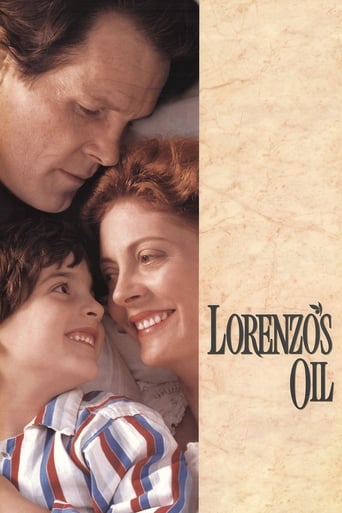ElMaruecan82
One month ago, I became a father; and if I could define parenthood in one word, I would say 'concern'. How about love and responsibility? Believe me, when you're 'responsible' for the life of someone you 'love', it all leads up to anxiety, fear… indeed, concern.Ever since your child's born, the high-pitched cries coming from fevers, injections or stitches, make your heart bleed. And it goes on and on till the first cigarette or car accident. I'm not there yet, but in one month, I could relate more to my parents than I ever did in my whole life. And basically, "Lorenzo's Oil", directed by George Miller, chronicles the worst situation parents can ever face: an incurable disease.The parents are Augusto (Nick Nolte) and Michaela Odone (Susan Sarandon), the victim of this genetic cruelty is their boy Lorenzo, and the 'evil' has an ugly name: adrenoleukodystrophy (or ALD). It's caused by an overproduction of lipids that destroy myelin, the sheath that protects brains cells. In other words, it's a degenerative disease and Lorenzo's days are numbered. He starts as a healthy and lively child who grew up in Comoros Islands where his father was assigned, and shows progressive signs of mental troubles: tantrums, fallings, loss of hearing… But George Miller has a very straight-forward way to get us to the diagnosis after 10 or 15 minutes.The news fall like a death sentence and the doctor's tone prepares the parents for the worst. But their denial feels like the first of the five natural stages of grief that finally conclude with resignation, but how to resign when it's about something no one knows? Indeed, as laypeople, we're all inclined to respect whatever the doctor says, because he knows and we don't. So what to do when the doctors don't know the very abomination that strikes your child? The point is not to shaken the doctors' credibility but to confront the parents to two options: resign or fight.I said 'concern' is the defining word of parenthood, but by becoming purposeless in front of death; concern transcends its very meaning to make the miracle possible. In the film's pivotal moment, Augusto suggests to Michaela that they have to approach ALD as they did with Comoros: a new world to get immersed to, no matter how long it takes. Augusto and Michaela make their own researches in libraries and medical institutes, grabbing any piece of information that can help them to understand, for instance, why the diet ordered by the doctors didn't decrease the level of lipids, but made it worse.Meanwhile, Michaela reads stories to Lorenzo, talks to him, like a normal child, rejecting such advice as putting him in an institute or to 'think of herself'. But she can't enjoy life while his boy is trapped in that body and Augusto can't sleep without finding the answers. The film is an exhaustive and painful experience to watch, with scenes inter-cut through fade-out, as to suggest the inexorable passing of time. Time becomes an enemy, injecting all the stress in the parent's mind and alienating them for their family, and meeting the disapproval of their entourage, even the supports group and the medical corpse represented by Dr. Nikolais (Peter Ustinov).Nikolais is genuinely concerned by the case but warns them not to be carried away by hope because science requires discipline and time. But time is a luxury they can't afford and that's the core of the conflict although "Lorenzo's film" isn't a anti-scientific movie. George Miller, a medical doctor, didn't portray the doctors as a bunch of conservatives. In fact, the biggest clash occurs between Augusto and Muscatine (James Rebhorn) the support group organizer. Augusto loses his temper advocating his right to inform the other parents about a new treatment but even Muscatine makes a valid point about the misleading effect of hope, even when it's real.All the interactions feel real to a gut-wrenching level. The portrayal of ALD isn't sugarcoated either, it's an ugly, scary, disturbing, made of screams, epileptic outbursts and some close-ups are absolutely unnerving. Miller's directing is understandable; his angular shots emphasize the dizzying dive in the Odone's nightmare. Augusto screaming of despair on the stairs while contemplating the idea of death is one of the film's most haunting moments. But it makes the whole ending more satisfying since the researches finally pay-off, when two cooking oils reveal to be excellent remedy against the chain of fatty acids responsible of the disease.The conflict with doctors is not over but as a father who has dealt with doctors, I could relate to their obsession not to see over the limits of 'what is known'. At a crucial moment, the Odones blames the support group for acting as if the boys served the progress of science, while the opposite should prevail. The bias toward the Odones never seems gratuitous because it shows people as part of it, while the power should be theirs. "Lorenzo's Film" is difficult to watch but its lesson is an inspiration for all humanity, showing that the measure of true heroes is to go beyond their limitations. It sounds cliché, but sometimes, reality gets more extraordinary than fiction.Two well deserved nominations for Best Actress, Sarandon has never been so heart-breaking and Best Screenplay, whose accomplishment is to make medical explanation accessible while sticking to a documentary-like realism. But Nick Nolte and George Miller deserved nods for their intense work, Nolte convinced me as a gentle, strong-willed, Italian father who refuses to surrender to fatality.I close the review with these three smiling faces from the poster in my mind, sadly realizing realize that all these three people died in real life, but happy to see that their fight was not in vain, if only, because there's a treatment that saved many boys who were diagnosed early enough, and rightfully called "Lorenzo's Oil".
nbwritersinbox
Extraordinary performances from Nolte (Augusto Odone) and Zack O'Malley Greenburg (as the young Lorenzo) are reason enough to view this outstanding medical drama. The script is sensitive and fascinating, the struggles and determination of the Odone Family riveting. It's beautifully directed, moving in every frame and uplifting in it's sheer humanity. Yes, here we see humankind at their best.Not an easy film to watch, as Lorenzo changes gradually from healthy boy to tortured teenager, the ravages of ALD (Adrenoleukodystrophy) taking its gruesome toll.Despite this, the film is not lurid or demeaning. Augusto's efforts to understand the complex biochemistry of the brain (cerebral ALD destroys brain nerves) is totally absorbing (even to viewers with only a passing interest in medicine).Attitudes to health and disease are also thoroughly examined here, as the Odones refuse to accept the established diagnosis that "nothing can be done". The script also doesn't pull any punches when it comes to observing the different reactions and family pressures caused by so-called "incurable diseases".This film offers us all a powerful message of hope, since Lorenzo begins to show signs of recovery, once the rare and precious oil has been identified, manufactured and administered. As cinema goes, this amounts to a tour de force.
Chrysanthepop
'Lorenzo's Oil' tells an extraordinary story of two parents determined to save their son. Not long after the Odone's move to the States, their son, Lorenzo is diagnosed with ALD, a rare progressive congenital disease that only affects boys. Since there was no cure, and while all the doctors administer experimental treatments that only contribute to the deterioration of Lorenzo's condition, the Odone's have to fight the battle by themselves. Miller's writing and direction are solid. He, along with the actors, really manage to express the pain and hardship of the family. It's easy to empathize with the characters as we hope for them to achieve victory. Nick Nolte's Italian accent might take some getting used to but once one looks passed that, his performance will strike the viewer as something brilliant. A charming Kathleen Wilhoite also deserves special mention as Michaela's supportive sister. The child actor too is terrific. And last, but not least, Susan Sarandon delivers a transcendent performance as Michaela Odone, the mother who will give up at no cost to save her son. Based on a true story, such films remind the viewer the value of determination and courage. While it has its costs, the end result just shows what hope can do when one doesn't give up. Clearly, the real Odone's must have gone through far more than what the film has shown but in the end they managed to save their son and Augusto is now a crucial part of medical research on treatment of myelin while Michaelahas unfortunately passed away as her son lives on. 'Lorenzo's Oil' is an inspiring story that reminds us how miracles can happen when you don't give up.







